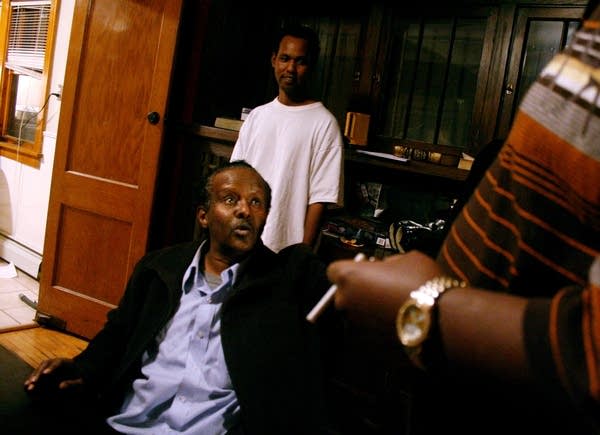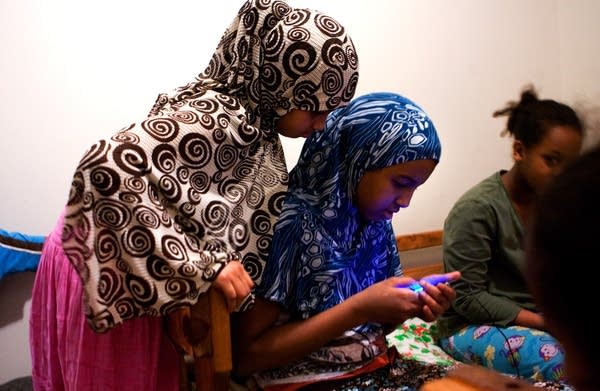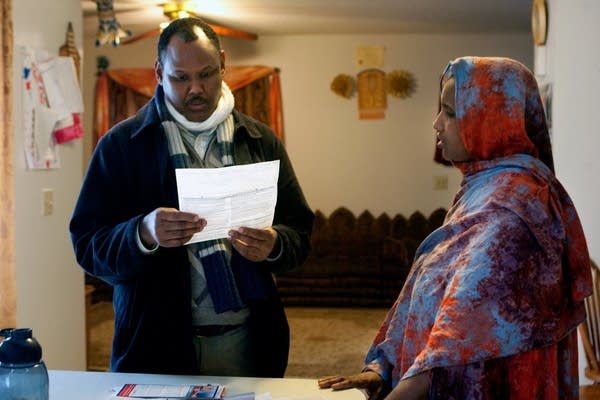The turmoil within: Somali families try to fit in, struggle to forget
Go Deeper.
Create an account or log in to save stories.
Like this?
Thanks for liking this story! We have added it to a list of your favorite stories.

Ismail Osman had Hollywood dreams when he escaped Somalia's civil war and arrived in the United States eleven years ago.
"When I came here, my goal was to be a movie star," he said.
That would be a lofty goal for any young person. But it was particularly daunting for the 28-year-old Osman, whose childhood memories from Somalia could make for the most violent kind of movie.
Osman said he witnessed the murder of his aunt and uncle. He watched the brutal rape of a young girl. He's still haunted by what he saw in his war-torn homeland, and by what he did. Though he doesn't want to give details, he said that even at age 12 he was big enough to carry an assault rifle.
Turn Up Your Support
MPR News helps you turn down the noise and build shared understanding. Turn up your support for this public resource and keep trusted journalism accessible to all.
"I don't like to say it, but in self-defense, I've done some horrible thing that I don't like to talk about," Osman said, his voice breaking.

Osman is one of a number of young Somali-Americans who are struggling with mental illness. Some, like Osman, suffer from post-traumatic stress disorder, others have bipolar disorder or substance abuse problems.
Once homeless, Osman now lives in a south Minneapolis bungalow with other young Somali men who bear the psychological scars of war and the trauma of seeing loved ones killed or tortured.
"In my nightmares, I get shot in my sleep," he said. "Somebody will say, 'You remember me? Ismail, you killed me. You take my life. Now I'm here to take yours.' And I jump out of bed. I'm sweating, hot. Sometimes I get up screaming."
TREATMENT: GETTING BEYOND 'CRAZY'
Social worker David McGraw Schuchman said it's important to recognize that every refugee in the Somali-American community has been personally affected in some way by the civil war. If they weren't shot at or beaten, their relatives were. But he says many aren't getting the help they need.
"For many Somalis, as I understand it, they have no concept of mental illness except 'crazy,'" said Schuchman. "And when they think of crazy, it's extreme cases, like practically throwing-off-your-clothes-in-public kind of crazy. So you're either crazy, or you're sane."
Schuchman's clinic, run by the nonprofit Volunteers of America, focuses solely on East Africans. He recalled failed attempts at drum up support for mental health services at an elders meeting in the late '90s.
"I realized what the people had heard was, 'If you know any crazy people, call David.' So they were very polite, but nobody called because nobody wants to admit they're crazy or anybody else is crazy," Schuchman said.
In fact, there are no words in the Somali language to describe the continuum of mental illness. Some Somalis refer to depression as "qulub." It's the same word that describes the sadness a female camel feels after she's lost her baby.
Over the years, Schuchman said he has learned to avoid focusing on diagnoses. Instead, he talks about symptoms. He'll ask his clients if they have problems sleeping, or if they feel anxious. Sometimes their mental anguish produces real, physical pain.
NEW COUNTRY, DIFFERENT RULES
Osman and the four men who live in the Somali group home know one another like brothers. They play chess, watch soccer, swap jokes and cigarettes. But it wasn't blood that brought them together. It was mental illness or substance abuse.

Osman said after he came to Minneapolis, he drank to wash away his memories and felt overwhelmed coming from a Muslim country, where alcohol wasn't tolerated, to an American youth culture where parties and booze were abundant.
Osman says his parents couldn't comprehend the choices he was making. They kicked him out of the house on a cold winter night, when he says they should have gotten him into treatment instead.
Osman eventually dropped out of the 11th grade. Now he's going back to school to get his GED. But to this day, he says his father won't accept him because of his past indiscretions.
"He looks at me and says, 'You're a failure. You are 27, 28. You don't have a degree," said Osman.
Osman said his father doesn't seem to believe that his mental-health struggles are real.
His housemate, Mukhtar Hussein Abdi, described the pain his drinking and struggles with bipolar disorder caused his brothers and sisters.
"I come home drunk. I would start a fight with my brother for no reason." Abdi said. "My sisters would get involved, try to hold me, then I smash a chair. Then I smash the microwave. And there's no subject to fight for. It was just the alcohol and what it did."
Abdi said he started drinking about three years ago, when he was 21. But he says he just liked to party.
"It was just for the love of it. I never had a rough time. I never went through torture, hunger, or anything, " Abdi said.
Abdi said he stole cars, got into fights and drove drunk. He racked up felonies. He said he finds wisdom and inspiration from hip-hop, but he knows the swagger he learned from Tupac and Snoop Dog have not been the best influence for a young man trying to find his way in a new land.
ANGER-MANAGEMENT FOR GIRLS
At Opportunity High School, where most of the students are Somali, Schuchman's intern, 28-year-old Deeqa Mohamed, a social work student at St. Catherine University, recently led an anger-management group.

The students in Deeqa Mohamed's classroom got into fistfights or acted up in other ways. All but one of the eight students were girls.
"Let's just revisit what we talked about last week. Anger management. Is it working? Instead of getting mad, you can just take a breather and calm down rather than just fighting..." Deeqa Mohamed said.
The teens nodded their heads. They've all been in the States for five years or less. One girl said it's tough staying calm when others pick on her.
Deeqa Mohamed told the class about her similar experiences when she came to Minnesota in 1991, when the Somali resettlement was just beginning. She remembers the American students at Roosevelt High School would mock her for her headscarf. Some would even try to rip off her hijab.
Deeqa Mohamed felt conflicted between two worlds, and even felt like she needed to dress for both parts.
She left the house wearing traditional Somali clothing, but when she got to school, she'd rush into a restroom to change into her American-style clothes. When classes ended, she changed back into her hijab and long dress.
"For a moment, I didn't even know who I was," she said
SOMALI FAMILIES, UNPREPARED FOR THE DANGERS
When Somali-Americans talk about a crisis among their children, they usually mean their sons. After all, young men are the ones joining gangs and committing crimes. The success stories often belong to Somali girls who are staying out of trouble and graduating from college.

It's difficult to say if Somali women are truly faring better than men in America, according to Professor Cawo Abdi, who has researched the gender question within her community But Abdi, who teaches sociology at the University of Minnesota, says the patriarchal Somali culture may have inadvertently helped girls here in the long run.
"There was more scrutiny paid to girls -- because when boys and girls spend a lot of time outside of the house, it's the girl who can come back pregnant, not the boy," said Abdi. "So, what it meant was girls were staying close to home, they were doing their homework, and they were succeeding in high school, whereas some of the boys were not doing that."
Somali families couldn't have forseen the dangers that lurked in the inner-city neighborhoods where many of them resettled, Abdi said
In Somalia, Abdi said, parents saw no harm in shooing their sons out of the house, because they knew other adults would be watching out for them. But that approach didn't work once parents moved their children to Minneapolis.
The boys were sent outside, where drug dealers and gangs roamed the street corners.
Social worker Abdulahi Mohamed said many of the young Somali-American people he works with came to the States at a young age, and had problems adjusting. They dropped out of school, and either joined gangs or picked up drugs and alcohol.
"I feel like the youth are trying their best to fit in.They're trying to survive the way they know how to," Abdulahi Mohamed said.
In the end, Abdulahi Mohamed said, they were rejected by both the American and Somali communities.
Abdulahi Mohamed , who was born in Somalia, said part of the problem is that when a family resettles in a new country, the roles of parents and children can reverse themselves.
Somali parents learned once they arrived in America that they couldn't discipline their children by hitting them. One of their top parenting tools was now considered child abuse, Abdulahi Mohamed said.
Meanwhile, their kids picked up English with relative ease, and they became interpreters for their parents.
"So parents became powerless. Children became powerful. And they took a dominant role that they never would back home," Abdulahi Mohamed said.
OVERCOMING THE MENTAL ILLNESS STIGMA
Safiya Mohamed is a single mom raising five kids in a sparse Minneapolis duplex. Her family embodies some of the biggest challenges for struggling Somali families in Minnesota: She feels like she has no control over her teen-age boys, she depressed and she worries that she's not capable of nurturing her youngest kids.

Safiya said she knows she's not well.
"I'm sick. Coming to America, I'm very, very sick. I have the pressure. Kids have problems. I don't speak English nice," she said.
Safiya used to be a businesswoman in Somalia, running her own grocery. But when the war broke out, her life of comfort quickly slipped away. She lost her home, her business, her mother, and even her husband. He fled in a separate direction, and she only learned he was alive, and in Kenya, two years after she heard he was killed.
She still talks to her husband on the phone every day, but she says she's been unable to bring him to the States because of immigration problems. Safiya knows his absence is taking a toll on her children.
"Their dad is not here, and that's the problem. Since I've been in this country, I haven't worked. I'm sick. They need a lot of things that I can't give them. They feel neglected," Safiya Mohamed said in Somali, with Abdulahi Mohamed translating.
But it's her three oldest children, all boys, who were giving her the most stress.
"Right now, I'm worried, because they don't have jobs, they can't go to school because they are over school age," she said. "They don't do anything here. And there are bad kids outside standing in the streets, and I'm worried that they may influence them. If my sons join that group, there's going to be trouble."
Safiya's youngest daughter, 12-year-old Hodan, never met her father. She said if her dad were around, he could help the family.
"And he could make my brothers stop doing bad stuff," Hodan Ali said.
Hodan said it's not easy seeing her mom when she's sick, like she was just a few days ago.
"She was on the bed, sleeping most of the time," Hodan said.

The family receives about $1,100 a month in public assistance. But Safiya Mohamed, with no job or car, doesn't feel like she's becoming self-sufficient. Her reality is nothing like what she envisioned for her family when she moved them to America.
She has told her daughters the stories of the odyssey that brought them to Minnesota. They escaped the fighting in Somalia by illegally crossing into nearby African countries, and she was attacked in a Botswana jail and lost her two front teeth.
Safiya tells these stories to her children in Somali and broken English. They respond in English and broken Somali.
The result is a generation gap as old as the immigrant story.
"When they came here, they adopted the American way of life so easily, but it's still difficult for me," Safiya said.
Safiya Mohamed says her children have been able to forget Somalia. But she says it's impossible for her to forget.





